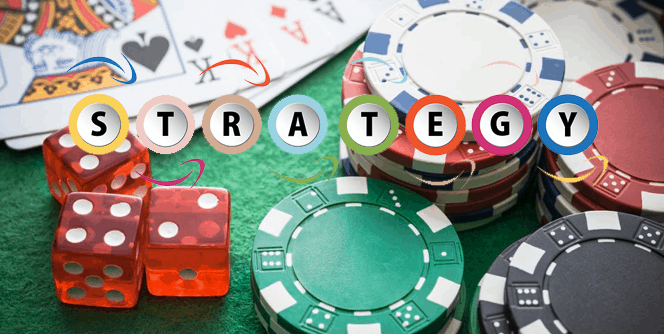When it comes to online casinos, people use different ways of placing bets so they can try get better results. Some methods help players think more carefully about how much to stake, others are more about staying calm and not making emotional choices. You’ll find some strategies based on numbers and probability, others more about managing risk. Whether or not a strategy really helps can depend a lot on what game you’re playing, and also how well you understand it. But still, the idea is usually the same—try to improve your chances and maybe enjoy the experience a bit more while you’re at it.

What is “House Edge”?
This thing called house edge—it’s something that’s always there in casino games. Basically, it means the casino has a built-in advantage, even if it’s small. It’s like, over time, they expect to win a certain amount from every bet. They calculate this using things like the game’s rules, the odds, how many decks in a card game, and what the payouts are like.
Take blackjack as an example. Depending on how the game is set up, the house might have an edge anywhere from 0.5% up to around 2%. So if you bet $100, the casino expects to keep between 50 cents and $2 eventually. But that’s over time—not each time.
That doesn’t mean the casino wins every round. Luck still plays a part, obviously. But the more people bet, and the longer they play, the more likely the house ends up ahead. That’s why understanding the house edge might help you choose your games better or even manage your money in a smarter way.
Types of Online Betting Strategies
Online gambling has loads of approaches people try to follow. Some folks lean on maths and probability, others focus more on keeping emotions in check. Here are some of the most used ones.
Money Management Strategies
These are more about how you deal with your cash. People using this style usually set a budget, decide how much they’re ready to lose before walking away, and try not to get carried away chasing wins or trying to recover from a loss too fast.
Progressive Betting Strategies
This type involves changing your bet size based on what happened in the last round. So, if you lose, maybe you bet more next time, or if you win, you raise the amount again. Systems like Martingale, Fibonacci, or Labouchere fall into this. Just be careful—these can backfire if you hit a bad losing streak and don’t have enough left to keep going.
Non-Progressive Betting Strategies
Here, you always bet the same amount, no matter what just happened. There’s flat betting—same amount every time—or fixed percentage betting, where you stake, say, 5% of your bankroll each round. These approaches are usually seen as safer since you’re not increasing your bet trying to chase anything.
Statistical Analysis Strategies
This one’s more technical. You look at stats, player records, team forms, that kind of stuff. Some people even use software or algorithms to predict outcomes. If done well, it can help you place bets based on actual patterns rather than guesswork.
Psychological Betting Strategies
Now this is more mental. It’s about staying calm, not letting emotions take over. Things like staying patient, thinking clearly, setting limits—all of that. Because when people let frustration or excitement lead, they tend to make bad choices.
Combination Betting Strategies
Here, players mix different tactics. Maybe a bit of statistical research, plus some money management and emotional control. The idea is to balance things out—take the good parts from different strategies and try not to let one weakness drag the rest down.

Most Popular Progressive Betting Strategies
People like progressive strategies because they offer big wins if things go right. Though they come with higher risks too. Here are some common ones.
Martingale System
With Martingale betting strategy you double your bet every time you lose. The hope is that one win will cover all losses and give you a bit of profit. So, lose $10, next bet is $20. Lose again, then $40. It can work for a bit, but if the losses go on too long, you might not be able to keep doubling.
Fibonacci System
This one follows the Fibonacci number series: 1, 1, 2, 3, 5, and so on. After each loss, you move up in the sequence. It’s less aggressive than Martingale, but still risky if losses stretch out longer than expected.
D’Alembert System
The D’Alembert betting strategy has you increase your bet by one unit after losing and reduce it by one after winning. It’s slower, and maybe feels safer to some. Works okay if your wins and losses are more or less balanced, but again, too many losses in a row and it’s trouble.
Labouchere System
Here, you write down a sequence of numbers. You bet the total of the first and last numbers. If you win, you cross them off. If you lose, you add that lost amount to the end. You keep going until all numbers are removed. Can be complex to track, but some people like the system.
Reverse Martingale System
The Reverse Martingale betting strategy flips the normal Martingale. You double your bet after a win instead. It’s meant to ride winning streaks and back off quickly when you lose. So it could work well in a hot run, but you can still lose fast if you’re not careful.
Most Popular Non-Progressive Betting Strategies
These ones don’t involve raising or lowering your stake after each round. They’re more steady, focused on stats or just playing it safe.
Flat Betting
Here, it’s simple. You bet the same amount each time. Easy to follow, helps avoid big losses, but it’s not really designed for big profits either.
1-3-2-6 System
You bet in a fixed four-step pattern: 1 unit, then 3, then 2, then 6. You reset if you lose at any point. If you win all four, you start fresh. Can give nice results during short win streaks, but still has risk during bad runs.
Kelly Criterion
This method uses a formula to work out exactly how much to bet based on your edge and the odds. Done right, it’s meant to protect your bankroll while still growing it. But it needs accurate info, which isn’t always easy to get.
Fixed Profit Betting
With this approach, you decide how much profit you want for that day or session. Once you hit that number, you stop betting. It’s more for people who prefer to take small, steady gains rather than chasing big payouts.
Percentage Betting
This strategy is all about staking a fixed percentage of your bankroll, depending on how confident you are in the outcome. So, more confidence, higher bet. It helps keep you from going broke too fast, but it needs discipline and a decent read on the games.
FAQ
Conclusion
At the end of the day, betting strategies are just tools. They can help you play smarter and lose less, maybe even win more. Some are simple, others more complex. None of them can promise wins every time. But if you use one that fits how you play, and you stick to it, it might give you a better shot at staying in the game longer.
